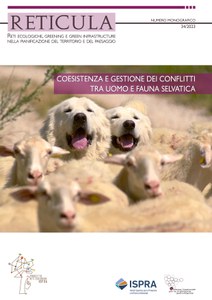Reticula n. 34/2023
Coexistence and management of human-wildlife conflicts
The proximity between human populations and wild animals has always generated conflicts. Recently, however, this phenomenon has reached an alarming extent, such that it is a critical factor for the conservation of the species involved and generates negative effects on the livelihoods of local communities. The IUCN defines such situations as “conflicts that arise when the presence or behaviour of wildlife poses a real or perceived, direct and recurrent threat to human interests or needs, leading to disagreements between groups of people and negative impacts on people and/or wildlife”.
These human-wildlife conflicts are complex, dynamic and do not lend themselves to simple analysis and solutions. To manage them effectively and, above all, with a view to coexistence, an approach is needed that considers the needs of both fauna and humans.
The issue is intended to collect experiences, activities, and good practices on the topic of human-wildlife conflict management, with a focus on contributions based on the assumption of a necessary coexistence between wildlife and humans, hoping that this issue will stimulate reflection on the topic by raising awareness that coexistence is not only necessary, but possible.
Publication available only on-line
Download the publication (pdf 19,5 mb)
SUMMARY
Preface by the Editorial Board
THE EDITORIALS
Human-wildlife interaction: conflict or opportunity for social growth?
Valeria Salvatori
Coexistence is equivalent to survival. A journey between past and present to reflect on human relationship with wildlife
Daniela D’Amico
POSSIBLE TOOLS AND EXPERIENCES FOR COEXISTENCE
When bears make the news: an analysis of human-bear relationship through the Italian media
Laura Scillitani
Large predators and the mandatory or binding nature of ISPRA opinions: a poorly posed question
Marco Olivi
The tools of the Common Agricultural Policy (CAP) 2023/2027 for preventing conflicts with wildlife
Luigi Servadei
The challenge of coexistence in the LIFE WolfAlps EU
Francesca Marucco, Arianna Menzano, Elisa Avanzinelli, Serena Perrone, Valentina Ruco, Maria Virginia Boiani, Laura Scillitani
bOX. The LIFE Bear-Smart Corridors project
Daniela D’Amico
Conflicts with human activities or threats to conservation? The case of the Bonelli's eagle in Sardinia
Elisabetta Raganella Pelliccioni, Massimiliano Di Vittorio, Vasco Avramo, Riccardo Nardelli, Fernando Spina, Lorenzo Serra
Bird strikes: more than a century of conflict in the world's skies
Alessandro Montemaggiori
BOX. Animal-Vehicle Collision Prevention System: a tool by LIFE project “SAFE CROSSING” to mitigate wildlife-vehicle crashes
Simone Ricci, Antonio Antonucci, Roberta Latini, Gian Paolo Pollini, Annette Mertens
The role of farms for the conservation of biodiversity in the Foreste Casentinesi National Park
Gloria Moretti, Davide Alberti, Nadia Cappai, Carlo Pedrazzoli, Luisa Vielmi
Innovative methods for detecting Vespa velutina nests
Simone Lioy, Riccardo Maggiora, Marco Porporato
The Wild boar in the Colli Euganei protected area: management applications
Michele Gallo, Giorgio Battilana, Giuseppe Rocca
Integrated passive defense from wildlife damage to fish farms: a case study in Mantova Province
Paolo Solci, Alessandro Riviera

